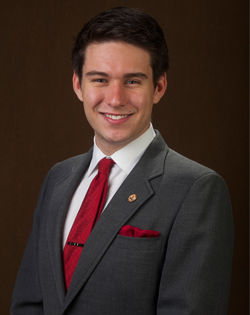Letter to the Editor
July 15, 2016
In the past few days, there have been several tragic deaths – in Baton Rouge, St. Paul, and Dallas – that have reignited an intense and often heated debate on race in America, and the role it plays in our own lives. We have to reckon with difficult truths and push ourselves to listen to one another, even when what we hear conflicts with our immediate assumptions. As SGA president, I want to offer the WKU student body my thoughts.
As a straight, white male, I will admit that I can never fully understand the experiences of those with other identities. I do not know what it is like to be afraid to hold my partner’s hand in public. I do not know what it is like to fear sexual harassment from a boss or co-worker or even on the street. And no, I do not know what it is like to fear for my life in mundane, normal encounters with police. But despite my removal from these identities and experiences, I can listen.
Throughout my time at WKU, I have listened to black students tell me about their own personal encounters with racism and the collective struggles faced by the African American community as a whole. Because I can never walk in their shoes, it is impossible for me – or any white person – to completely understand their experience. But I can walk alongside them. Their fears and realities are not rendered non-existent just because they aren’t mine. We can – and should – acknowledge the desperately important truth that black lives matter, whether we are black or not.
Much of the controversy surrounding this latest iteration of the centuries-old racial justice movement is in its use of the phrase, “Black lives matter,” which is characterized by some to mean that other lives do not. Some have used the phrase, “All lives matter,” as a rebuke. Yes, all lives matter, but we must understand that, “All lives matter,” is an aspirational statement, not a reflection of the current reality. When people of color continue to face real and demonstrable inequalities in education, housing, income, employment, and criminal justice, glossing over those inequalities only deepens them.
We must also understand that calls for criminal justice reform are not synonymous with condemnation of police. Coming from someone who wholeheartedly respects our law enforcement officials, we need dedicated police officers to keep our communities safe, and many police departments across the country – including in Dallas – have made great strides in implementing community-based policing models. But that is not the case everywhere. The problems we face are not individual. They are systemic, and more reforms are necessary.
As we confront these truths and think about how to respond, SGA is taking its own steps to build a more inclusive campus environment at WKU. In the fall of 2015, I launched an initiative called MyCampusToo, which has wo! rked with marginalized student communities over the past year to address how SGA can enhance its diversity, and how we can create a more understanding, equitable, and welcoming atmosphere at WKU overall. We intend to keep collaborating with student organizations and other university partners to continue this initiative next year, and we have much work to do.
As we further our efforts, think about how you, in your own lives, can help our communities, state, and nation move forward. Avoid demonization of people who do not think or look like you. Avoid listening to TV talking heads or radio show hosts for instructions on what your opinion should be. Listen to stories and experiences that might be difficult to understand. And assert the validity of others’ experiences, even if they are not your own.
We have a lot of work to do, but I know we can do it together.
-Jay Todd Richey, Student Government Association President

























